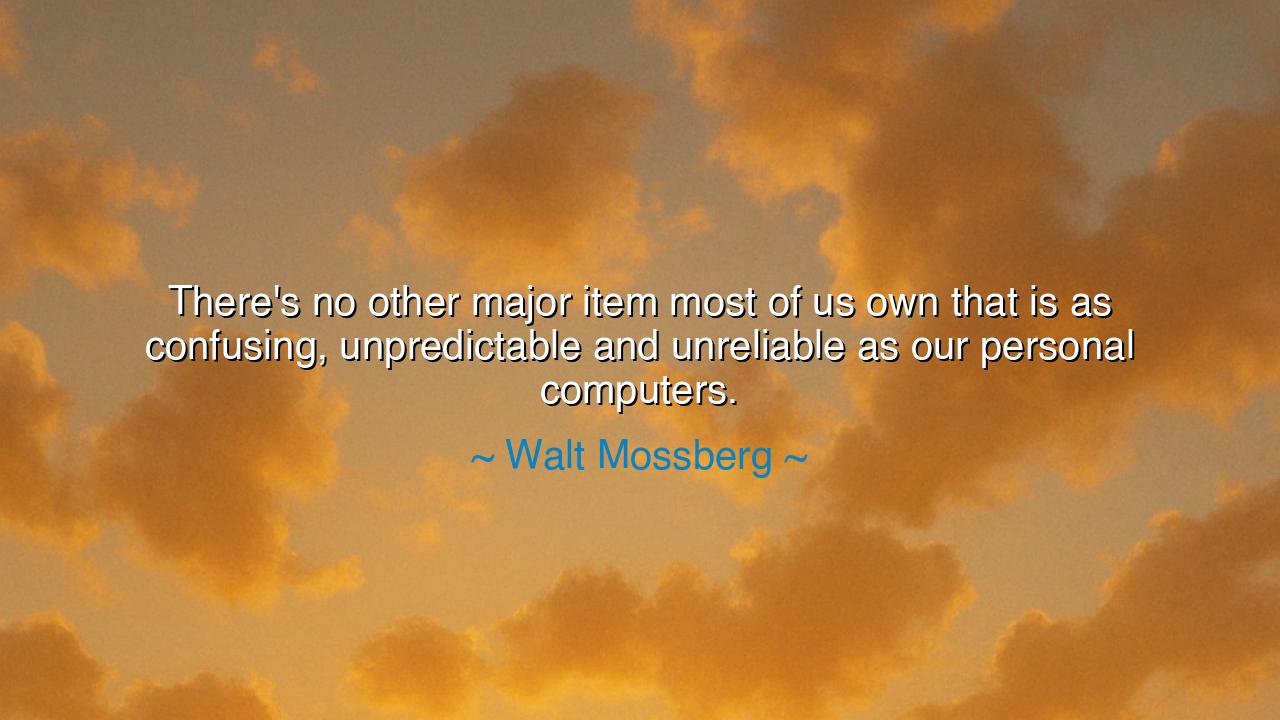
There's no other major item most of us own that is as confusing
There's no other major item most of us own that is as confusing, unpredictable and unreliable as our personal computers.






"There's no other major item most of us own that is as confusing, unpredictable and unreliable as our personal computers." – Walt Mossberg
In the vast and complex tapestry of life, humanity has long sought to tame the unknown, to create order from chaos. But in the realm of technology, especially in the advent of the personal computer, we find ourselves faced with an enigma. Walt Mossberg, with sharp insight, speaks of a truth that many of us experience daily: our computers, those seemingly essential tools of modern existence, are often unpredictable, confusing, and unreliable. In the very act of attempting to control them, we find ourselves swept up in a torrent of errors, crashes, and frustration—a paradox for a tool designed to bring us closer to certainty.
Throughout history, humans have crafted tools to expand their capabilities, from the simple wheel to the majestic catapult. In each case, the tool was an extension of the human will to shape the world. Yet, the computer, born from the brilliance of minds like Alan Turing and John von Neumann, promised a tool that could surpass human limitations, an instrument of infinite possibility. And yet, here we stand, facing the irony that this tool, more powerful than the mightiest engines of the ancients, is as often a source of confusion as it is of creation. For every step forward in technological advancement, there are countless missteps—errors that bring us face-to-face with the limitations of the machines we’ve built.
Consider the ancient Greeks, who crafted the Antikythera mechanism, a marvel of mechanical engineering that was designed to predict the movements of the stars and planets. This device, though intricate and sophisticated, was understood by few and mastered by fewer. Even in the age of wonders, the creation of tools to predict the natural world was fraught with uncertainty. Mossberg’s quote is a modern echo of this age-old struggle: we have created a device so complex, so powerful, that it becomes difficult for the average person to truly master it. Like the Antikythera mechanism, our computers are marvels, but they often remain mysterious, slipping from our control just when we need them most.
It is in this light that Mossberg’s words are particularly resonant. The computer, much like the chariot or the siege engine, is a tool of tremendous potential, yet it brings with it an equal measure of frustration. The unreliability of modern computers, the constant updates, the glitches, the crashes, can be likened to the great challenges faced by early inventors. The creator of the first mechanical clock in ancient China, for example, would surely have marveled at the precision of today’s computers, yet would also have been astounded by how often even the most sophisticated of these machines fail to perform as promised. In each case, human ingenuity is stymied by the complexity of the tool itself.
Let us turn to the renaissance of science and technology, where the great Leonardo da Vinci sketched out machines that could fly, swim, and perform miracles. He, too, struggled with the understanding of the mechanisms that could bring his creations to life. Even with all his brilliance, his machines were left unfinished, often impractical due to the limits of the technology at the time. Da Vinci's work, like our computers today, was both visionary and flawed, filled with potential but constrained by the realities of its time. The lesson is clear: technology, no matter how advanced, will always carry with it the seeds of its own imperfection.
Thus, Mossberg’s observation points us to a deeper truth about the relationship between humans and their creations. We have built the personal computer to be both a tool and a companion, an extension of our will and intellect. Yet it remains an unpredictable force, reminding us that no matter how much we seek control, there will always be aspects of life—especially those involving technology—that elude mastery. Our efforts to make sense of the computer, to bend it to our will, must be tempered with patience, acceptance, and an understanding of its inherent unreliability.
The lesson here is one of balance. While we must strive for mastery over the tools we create, we must also acknowledge the limitations of those tools. We cannot expect perfection from our computers any more than we can expect perfection from ourselves. Instead, we must learn to navigate the complexities of these tools with grace, accepting their faults as part of the process of creation. In doing so, we free ourselves from the constant struggle to control, and allow innovation to flourish, despite the imperfections inherent in all things. And as we do, we find that it is not the perfection of the tool, but the creativity of the user, that will always be the true measure of success.






AAdministratorAdministrator
Welcome, honored guests. Please leave a comment, we will respond soon